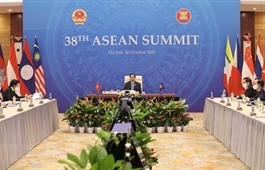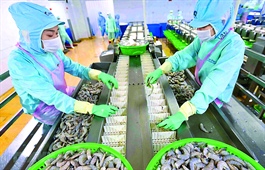Deputy PM tasks ministries with cautious, flexible price management
Deputy PM tasks ministries with cautious, flexible price management
Deputy Prime Minister Le Minh Khai has asked ministries, agencies and localities to closely monitor market developments and to be cautious, flexible and active in price management in order to stabilise price levels and promote economic growth.

Deputy PM Khai made his comments at a meeting to review and evaluate price management in the third quarter of 2021 held in Ha Noi on Tuesday.
Khai, who is also head of the Price Management Steering Committee, suggested that ministries, agencies and localities focus on managing prices of electricity, food, fertiliser, animal feed, medicines, biological products, medical supplies and especially gasoline.
The Deputy PM said that from now until the end of the year, the average CPI is expected to increase by around 2 per cent. Therefore, the inflation control target assigned by the National Assembly and the Government in 2021 was not under severe pressure, while the possibility of achieving the target was high.
Khai told participants that price management and administration have made a positive contribution to maintaining macroeconomic stability, removing difficulties and obstacles for businesses and individuals in the country’s economic recovery and development. He noted that price stabilisation also helped stabilising people’s lives in difficult times.
Khai said that early next year, many countries will start to open and restore production, so the demand for materials and energy will increase, noting that although Viet Nam had controlled the pandemic well, the developments of COVID-19 posed potential risks, causing difficulties in the production, supply and circulation of goods.
From now until the end of this year, Khai required ministries and sectors to closely monitor market developments, and operate in compliance with legal provisions, while proactively adopting adequate, effective and timely solutions.
Providing price management solutions for the remaining months and indications for 2022, the Government’s representative asked the Ministry of Finance to collect opinions of ministries and agencies in order to closely follow the situation and practical conditions of Viet Nam.
In addition, the Ministry of Foreign Affairs must coordinate with the Ministries of Finance, Planning and Investment and the State Bank of Vietnam to closely monitor developments in the world situation, general inflation in countries and market trends.
Regarding important and essential commodities, the Deputy Prime Minister suggested that ministries, agencies and localities closely monitor market supply and demand to prepare reserves and stabilise prices, especially in the remaining months, the Lunar New Year and the beginning of 2022.
Khai also has paid particular attention to this group of goods, because this year the economy has been heavily affected by the COVID-19 pandemic. Therefore, ministries and sectors must pay close attention to organising the reserve and maintaining work appropriately.
Delivering a speech at the meeting, Deputy Finance Minister Ta Anh Tuan said price levels in the economy in the first 10 months of this year were basically predicted in the price management scenario since the beginning of 2021.
Tuan said the consumer price index (CPI) in the first nine months 2021 rose by 1.82 per cent compared with the same period last year and it was the lowest increase since 2016. The country’s inflation in nine months increased by 0.88 per cent. The CPI in October, 2021 is expected to decline by 0.1-0.15 per cent with the average increase in 10 months estimated at between 1.81-1.83 per cent compared to the same period last year.
Prices of essential products such as animal feed, fertiliser, construction materials, gasoline and liquefied petroleum have increased due to a shortage of raw materials and high transportation costs.
The Ministry of Finance reports that inflation is under the Government’s control. Inflation has also remained low this year. However, next year’s inflationary pressure will be higher, especially when the energy crisis could worsen all over the world.
Tuan noted that price management should continue to be conducted with caution, flexibility and proactivity, focusing on target-based inflation control and supporting dual goals of the Government. Management must keep the price level stable in order to remove difficulties for production and business and ensure the lives of people in the context of disease prevention and control.






















